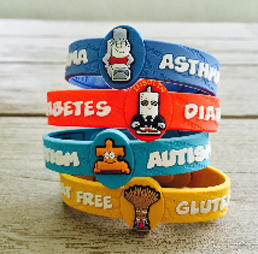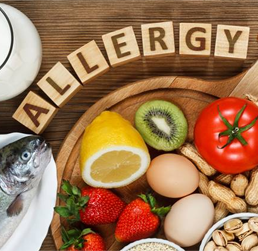
Mustard just doesn’t cut it for all of us… learn about the mustard allergy.
If you follow AllerMates on social media, you may recall our announcement of two NEW charms – MUSTARD and CITRUS – coming to our store a few months back. Well, the time has come to share with you that… they’re here!
Obviously, if we’ve taken the time and effort to design a new charm and manufacture it, there has to be good reason. And there is.
The reason is that a growing number of our children are affected by these two types of foods, and like all of our kids’ food allergies, it’s important to make people aware. Therefore, I want to share with you a few tidbits on each of these particular allergens, so that you can help spread the word.
Up first? One of America’s favorite condiments. Here are five things to know about the harm it can cause:
- A mustard allergy is not confined to the stuff in the bright yellow bottle; rather, the issue derives from the seed that’s used to make the liquid – the mustard seed. And this fact, like with other food allergies, makes it highly important to read food labels, because…
- The mustard seed is ground into dry mustard, which is used in countless foods and even other condiments, including ketchup, barbecue sauce, mayonnaise, marinades, salad dressings and many, many more.
- Under European law, mustard is considered one of the top 14 allergens and must be declared on all labels, while in the U.S., we only recognize the top eight, of which mustard is NOT included. That’s why it’s important to read all ingredients, knowing that mustard may fall under the guise of “spices.” So if you run across “spices” on your label, call your manufacturer to find out just exactly what those are before you trust the food with your mustard allergic kid.
- While the mustard allergy is uncommon, a reaction can be severe for those that do have the allergy and may require an epinephrine injection. Therefore, treat it seriously.
- Having a mustard allergy doesn’t automatically make someone allergic to other seeds (e.g., sesame), BUT there’s always the possibility they can be. That’s why it’s important to schedule time with an allergist to rule other allergens out.
And finally, if you have a kid with the mustard allergy, AllerMates is proud to help you in your efforts to keep him or her safe. Visit our store, and check out our new mustard allergy charm, designed specifically for our multi-charm bracelet. It’s a great way to make others aware so that they can help your child when you’re not around. : )
Iris
P.S. Want to learn about other food allergies and ways to protect kids living with them? Sign up for my newsletter, and I’ll share what I know.






